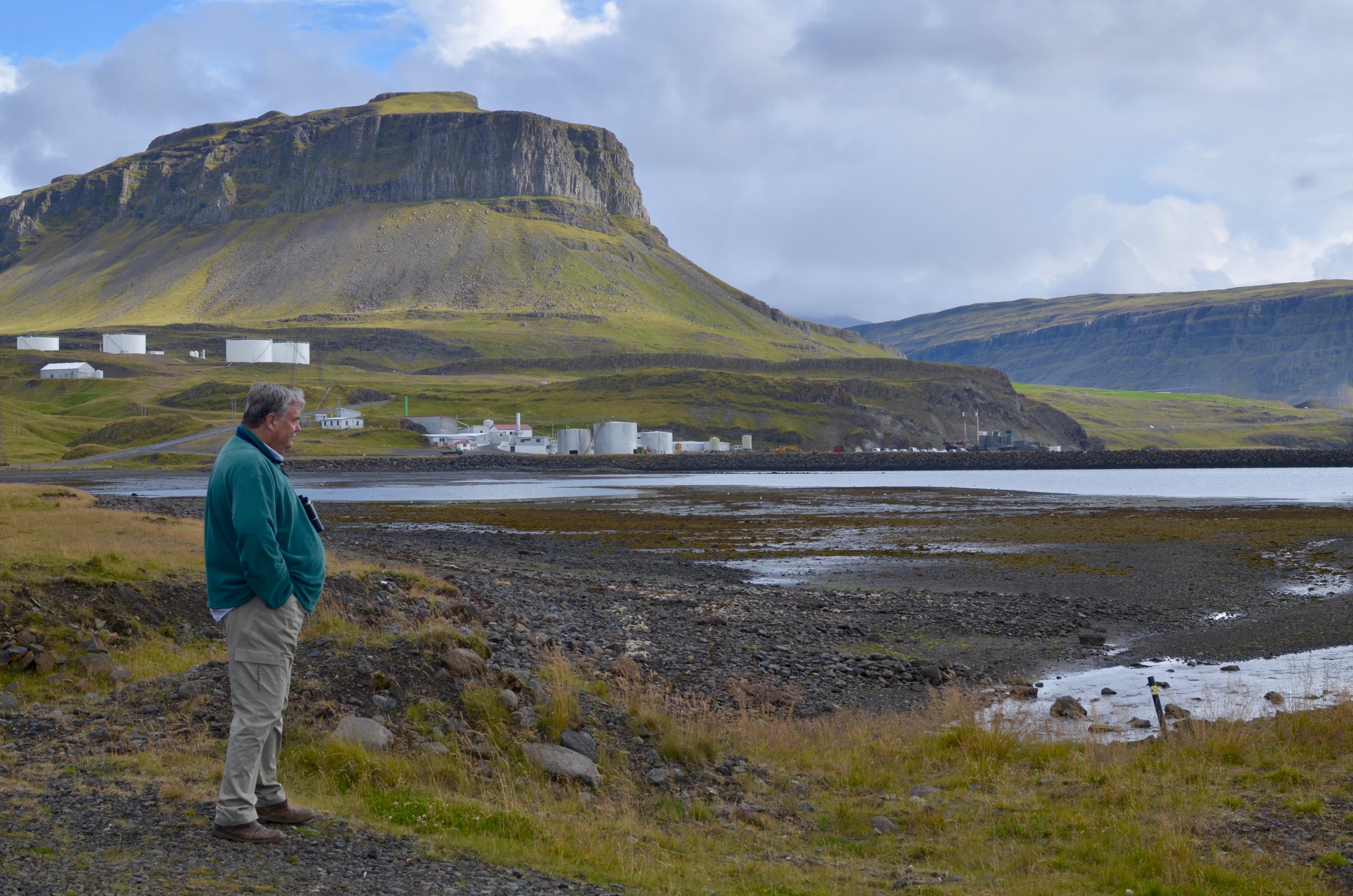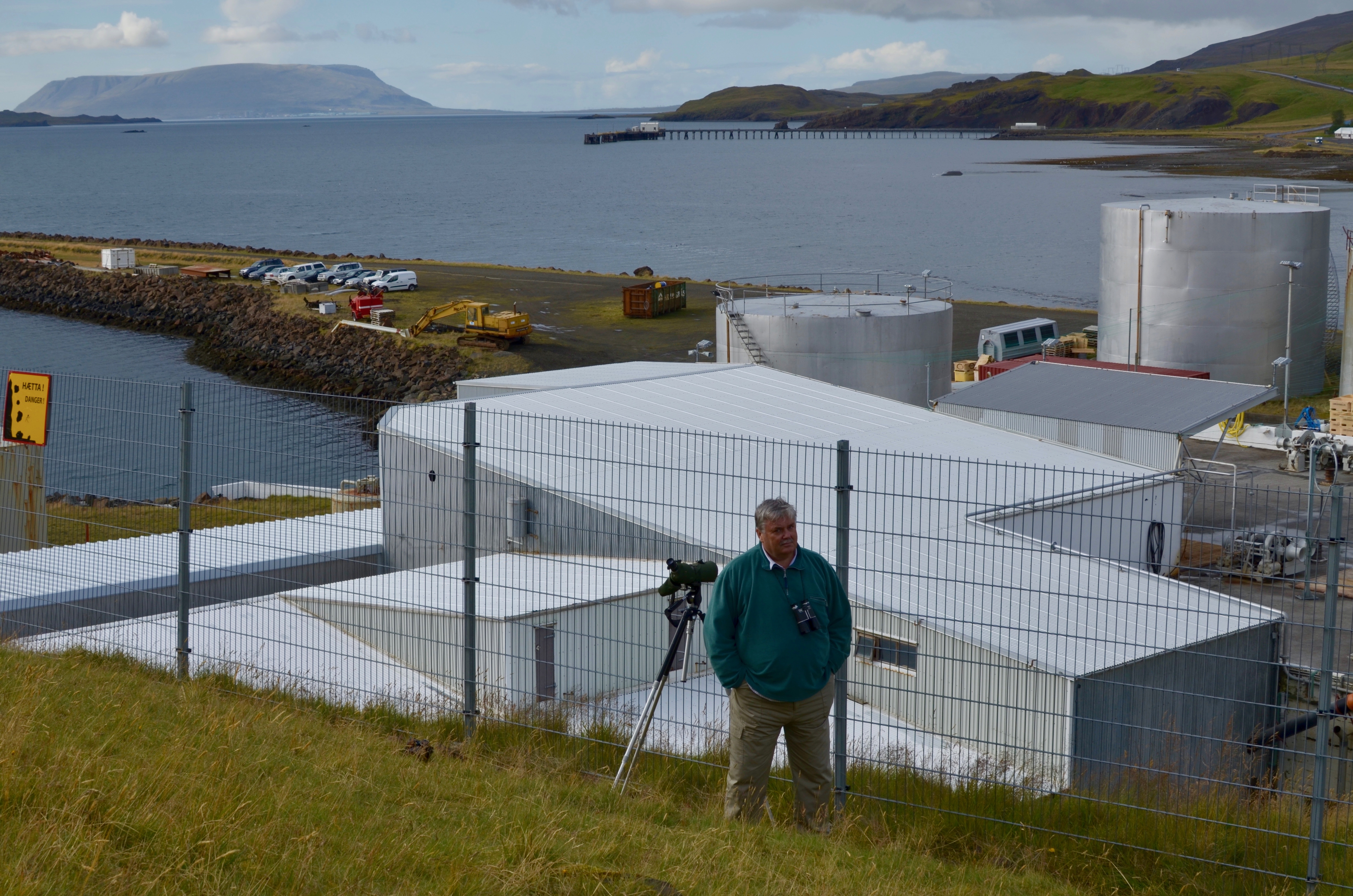
Photo: The Whaling Station, Hvalfjörður
It’s a beautiful setting for some less than beautiful deeds. Hvalfjörður means Whale Fjord and the group of white buildings at the foot of the pier into the fjord are where Iceland’s catch of Fin Whales are flensed and butchered under the eyes of a Japanese inspector – for all the Fin Whale meat goes to Japan. Over 100 Fin Whales have had this fate in 2018.

Photo: Hvalfjörður Whaling Station
If any whales had been killed during my short stay in Icleand last week I could have stood above the whaling station looking down on what was happening. I wonder what impact the sights and sounds and smells would have had on me.
Icelanders are very keen to say that they are a proud independent people who will make up their own minds on whaling – and that’s fair enough. Nobody is saying that anyone else can make Iceland’s whaling decisions for them – but that doesn’t mean that the world won’t think less of them if Iceland makes the wrong decision. In some ways the announcement of a review of the issues around whaling have raised the stakes. If Iceland carries out a review of whaling and then continues to kill whales then some will give up on them, and think less of them for it. I haven’t met anyone outside of Iceland who says that a continuation of whaling by Iceland is what they want – but I live in a bubble, as we all do.
I think we Brits generally feel an affection for Iceland – an island nation off the coast of Europe, like us, who whipped us in the Cod War and again (if you are English) at football in 2016 Euros. What’s not to like? And having visited Iceland, I feel even warmer to its countrymen and women – their friendliness, their informality and their sense of fairness would be three reasons for that. But just as one might feel less like spending time with a friend or relative who has bad habits then the same is true of a foreign country. Iceland doesn’t have to take any notice of what the international community thinks of it, but that won’t stop us from thinking it, and we might decide to get on a plane to Spain, Denmark or to stay at home rather than visit Iceland in future.

Photo: Old Whaling Ships, Hvalfjörður
The two beached boats in the image above are whaling ships that were sunk many years ago by the Sea Shepherd organisation – one of them while its crew were sleeping on board (according to folk I met in Iceland but not according to the Wikipedia account). They are owned by the sole whaler in Iceland and I was told, perhaps unreliably, that he wakes up every day with the image of those boats in his head and that makes him more determined to continue whaling. Some of us are that stubborn.
Certainly, the sinking of these boats reduced the Icelandic whaling fleet but it may have increased the resolve of icelandic whlers. And many told me that it made the last Icelandic whaler a victim and swung public opinion toawards him even at a time when it was perhaps drifting away. I can believe that – the sinking of these two boats is still the only act of terrorism carried out on Icelandic soil (and water).
Iceland is a fantastic place to visit. I hope they make it easier for us all to do so in future.
[registration_form]
Wouldn’t visit Denmark either because of their support for Faroese whale and dolphin killers.
I came here to make the same comment. It strikes me that Mark’s paragraph “Icelanders are very keen to say that they are a proud independent people…” etc. could just as easily be written about Faroese.
Mark’s been far more effective in getting action on Icelandic whaling than I ever have. However, I would disagree with the sentiment that, ‘Icelanders…will make their own mind up on whaling – and that’s fair enough’. This implies that whales are just another commodity and that a [human] political entity, in the form of a nation state, has the right to do whatever it wishes with them.
Whales are intelligent, sentient creatures, who show self-awareness and the capacity to empathise with others; they have complex social interactions and cultures. They should not be regarded as ‘things’ or property.
Consequently, just as we have international law that prohibits the gross infringement of human rights by any person or state (whether it’s of the citizens of that state or not), we need international law to prohibit the gross violation of the rights of non-human animals. How far we might extend this is a moot point, but the case for offering such protection to cetaceans and primates seems to me to be unassailable.
Michael – I agree with your sentiments but you are talking about what might be and I was writing about what is. Iceland will make up its own mind on whalng, that’s how the world works. And it will be a while before we have international laws banning whaling. It could be argued that we have almost got to the point where thre is no commercial whaling without those laws. Iceland will almost certainly be the next country to end whaling – I hope it is soon.
The other point about International Law is that it works differently to the law within a sovereign state. A citizen of a country cannot choose to opt out of any of that country’s laws but the same is not true in international law. On the whole, international law is based on consent: countries sign and then ratify treaties and conventions and are then legally bound by them but if they choose not to sign or ratify they are under no legal obligation to act in accordance with the treaty/convention.
Secondly, once a country has signed up to a convention or treaty the means to force it to meet its treaty obligations are less straightforward than within a national legal framework. There are some heavy penalties – armed response and economic sanctions, for example – that the international community can apply but these are generally not available within the terms of international wildlife protection treaties and conventions and failure of a country to abide by the terms of these conventions is really only punishable by the transgressor being held up to international disapproval.
This does not mean that International Conventions on wildlife protection are a waste of time – countries do sign in good faith at least some of the time and international peer pressure can be effective, but it does mean that if Iceland or Japan choose to stay out of any international law on whaling there will be relatively little the rest of the World can do about it other than to to keep trying to persuade them to stop. This means that with or without an international law the only way that Iceland or Japan will ever stop whaling is if they decide that that’s what they want to do.
This is made quite clear by the fact that we already have the International Convention for the Regulation of Whaling which has adopted a moratorium on commercial whaling since 1982 but these two countries and a number of others have chosen to ignore or circumvent the moratorium (e.g. by so-called ‘scientific whaling’). It is up to the rest of the world to persuade them that the time has come to stop for good.
Thanks, Mark and Johnathon W.
You’re both right, of course. Working for several years to advance the UN Convention on the Rights of the Child, I grew painfully aware of the limitations of such international agreements and treaties. However, few people see them as operating in the same way as national legislation or as a substitute for local activism, lobbying and mobilisation. Despite their limitations, though, they can produce some surprising advances, not least because they shift the burden of argument onto the shoulders of those who wish to oppose the international consensus. In this case, a clear declaration that cetaceans and other sentient creatures should never be considered as the property of a nation state would be part of the wider change that is essential to repair humanity’s currently catastrophic relationship to the natural world.
Thank you, Jonathan, for a very useful explanation of this legal point.